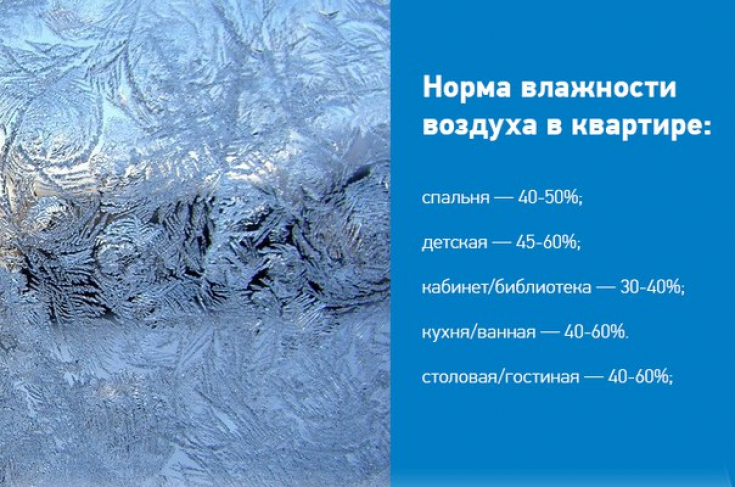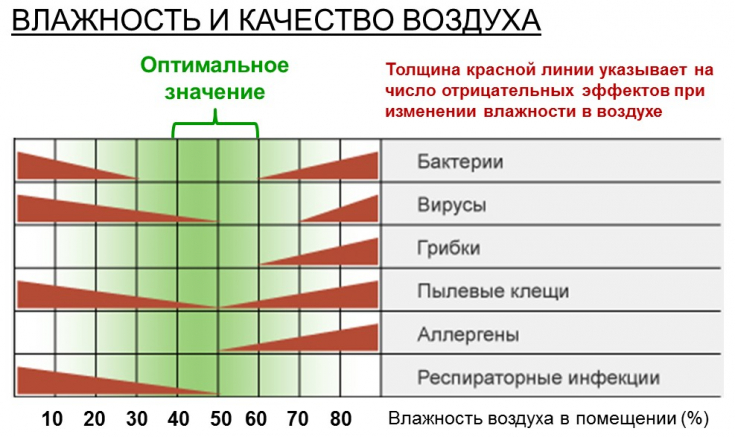With the onset of cold weather, we are already used to switching to a special mode of life. Moisturizing cream is replaced by nourishing, preference is given to hot and warming rather than soft drinks, and light clothing is put away in the closet until nbsp;nbsp;the next spring. Approximately the same should be done with the microclimate in apartment: to humidify the air in winter is no less important than to cool it in summer.
- Why humidify the air in winter: arguments put forward by health
- Air humidification from beauty point of view
- How to humidify the air in apartment, but not create dampness
Why humidify the air in winter: arguments put forward by health
The air humidity in the room in which we spend most of the time can be called without exaggeration a factor that determines our propensity to colds. And if you didn't know it — it's time to find out how the body reacts to dry air.
You should start with the functions that the mucous membrane of the nasopharynx performs. It produces a secret (mucus), thanks to which the air enters the bronchi and lungs sufficiently moistened. But & nbsp; besides this, the secret provides favorable conditions for the vital activity of microorganisms that inhabit the surface of the mucosa.
They are very important for human health, as they provide local immunity: they form a microbiological environment in which many pathogenic bacteria and viruses are unable to survive.

But with the constant inhalation of dry air, the mucous membrane has to work hard to moisten it, and sooner or later its resources are depleted. As a result, the air enters the deeper respiratory tract dry, and the microflora of the nasopharynx loses its ability to resist pathogens. In such circumstances, the development of acute respiratory infections or SARS — only a matter of time.
Read also: Cold Prevention: Health Hacks
Air humidification from beauty point of view
Appearance suffers from dry air no less than health. You have most likely noticed how hair becomes dull in winter, and skin becomes pale. The reason for this is a lack of moisture, without which metabolic processes are disturbed in the skin.
Drinking enough liquids does not save the situation, since some of the oxygen and moisture enters the skin directly from the air. And precisely thanks to the "air" moisture in the uppermost, stratum corneum of the skin, the last cycle of cell life proceeds — their final death and exfoliation. In conditions with overdried air, the cells are poorly exfoliated, as a result of which they "grow" each other, which leads to roughening of the skin and its severe peeling.
Read also: Why you need to moisturize your skin and how to do it right
How to humidify the air in apartment, but not create dampness
Home experts are ready to share a little tricks that will help make the air in your apartment more humid, and protect your health.
-
Modern Humidification Systems — the best option, which provides for automatic maintenance of a given humidity level. For winter time, 40-50% moisture is sufficient. At the same time, the function of ionization and silvering of air is optional — ionization can play against you, turning relatively harmless molecules into toxic ones, and silvering, designed to disinfect the air — nothing more than a publicity stunt.

-
If it is not possible to purchase a special humidifier — home mini-fountains, aquariums with open tops, or just bowls of water, placed on elevations (on cupboards, window sills, countertops) will help. In order not to create excessive dampness, it is important to adhere to the following rule: for every 2 m2 room area, no more than 15 cm2 of the "water surface" is needed, from where moisture will evaporate. This ratio is relevant for an air temperature of 20-22 ° C, but with with every degree exceeding this value, you need to add 5 cm2 of water area.
-
Keep the air at the optimum temperature. For common rooms, 20-22°C is enough, and for the bedroom, the temperature can be lowered to 18-20°C. At this temperature, the air retains moisture better, and it evaporates more slowly from skin surface.
-
Avoid using wet towels hung on central heating radiators. This raises the humidity level and the air temperature too sharply. In addition, such evaporation leads to the appearance of small water particles in the air, which can affect health as negatively as dry air.
Read also: How to humidify the air in apartment: 9 easy ways
We hope these tips will help you maintain a healthy indoor climate and allow you to protect yourself from seasonal diseases.
Read also: Proper care skin in winter
You may be interested: Just 3 minutes a day for a perfect face. Gymnastics is suitable for everyone and does not take much time.






Add a comment